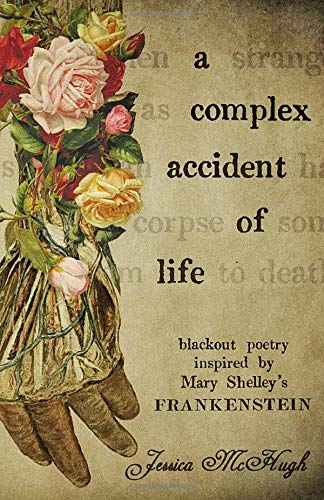
REVIEW BY GABINO IGLESIAS
—
Jessica McHugh’s A Complex Accident of Life is complex, but it’s no accident. Inspired by Mary Shelley’s Frankenstein, McHugh created a series of Gothic blackout poems. However, the book includes a “clean” version of each poem as well as images of the original pages she used, which clearly show the markings, ink, colors, and different approaches. The juxtaposition is visually engaging and reveals the artist at work. The result is a collection of short poems about a plethora of topics that quickly reveals itself as an objet d’art.
The interesting thing about having images of the original pages next to the end result of McHugh’s work is that readers get to see the words as they originally appeared in Shelley’s work and then can read the hidden poetry McHugh revealed by slicing away the “extra” words that were hiding it. This way, a page of Shelley’s work transforms into something new that carries a its own meaning:
“I am a vessel of dauntless courage
And severe evil.?
My joy will endeavor,?
My rage possess.”
According to the author’s note that kicks off the collection, McHugh originally made a few blackout poems to give away or sell. This means that, more than blackout, the pages she worked on were carefully colored and drawn on to reveal the poem within. In A Complex Accident of Life, there is plenty or color, patterns, curlicues, and drawings that go from smooth and organic (like the one for A Blessed House, which resembled a close-up of a cluster of colorful cells) to blocky blackout (although the color used to cover text is never black) with words trapped in tiny rectangles. From time to time, the blackout process is so clearly a work or art that it presents readers with a recognizable image. For example, “A Kind of Pleasure” shows a raging storm at sea, complete with dark clouds, roiling waves, and lightning bolts in the sky.
Perhaps the best thing about blackout poetry is the way it reveals not only a secret that was always on that page but also the personality and taste of the poet plucking out those special words. Reading the poems in A Complex Accident of Life isn’t reading chunks of Shelley’s work; it’s reading McHugh’s voice. “It was on a dreary night of November that I beheld the accomplishments of my toils,” writes Shelley. Here, dreary, night, and toils could offer an easy start, but McHugh picked November, and the result is a poem that shares the collection’s title and perfectly exemplifies how the poet’s voice is at the center here, even if the source material is Shelley’s work:
“November was half-extinguished,
A dull yellow eye?
Within I endeavoured to form,
Beautiful and horrid,
A complex accident of life.”
Themes abound in this collection, but they all carry the dark, gloomy atmosphere of Gothic literature. Darkness, wounds, monsters, and “quiet misery” can be found in this pages, but the poems are so short that recurring themes never get boring. McHugh received a Bram Stoker Award nomination for this collection, and it’s easy to see why: A Complex Accident of Life is a monster born of the pieces of another monster, all carefully rearranged and brought to life by McHugh. I hope she tackles another classic soon.
—
Gabino Iglesias is a writer, editor, literary critic, and professor living in Austin, TX. He is the author of ZERO SAINTS and COYOTE SONGS. You can find him on Twitter at @Gabino_Iglesias.
![[PANK]](https://pankmagazine.com/wp-content/themes/pank/assets/images/pank-logo-large.png)
